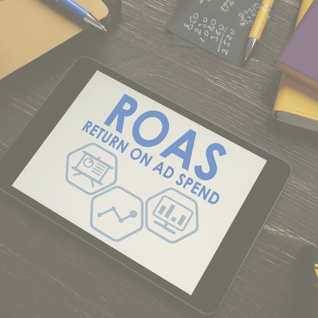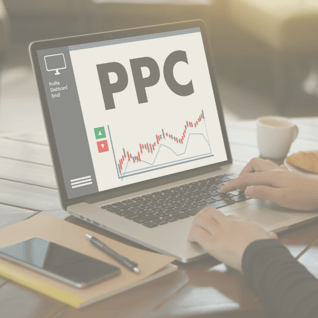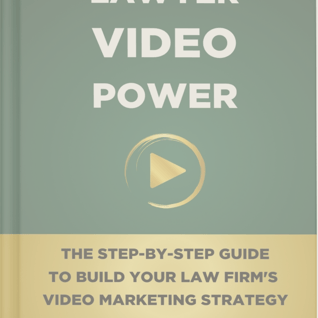The Step-by-Step Formula to Calculate Your Law Firm's Advertising Budget
Ad Budget Calculator for Law Firms
This 9 step approach provides a comprehensive method for determining an appropriate ad budget based on various financial metrics:
1. Calculate Average Case Value (ACV)
ACV: The average revenue generated per client or case.- Formula:
ACV = Total Revenue Per Month / Number of Cases Per Month
- Example:
If your firm generates $100,000 per month and handles 20 cases per month, your average case value will be $5,000:
ACV=100,000/20=$5,000
2. Determine Client Lifetime Value (LTV)
LTV: The total revenue a client generates over the duration of their relationship with the firm.
If the ACV represents the average revenue per case and the average client has multiple cases, multiply ACV by the average number of cases per client to determine LTV.
- Formula:
LTV = ACV × Average Number of Cases per Client
- Example:
If ACV is $5,000, average client has 2 cases:
LTV = $5,000 × 2 = $10,000
3. Calculate Customer Acquisition Cost (CAC)
CAC: The amount spent on marketing and sales to acquire a new client per month.
- Formula:
CAC = Total Sales and Marketing Expenses / Number of New Clients Acquired
- Example:
If your total marketing and sales spend is $20,000 and you acquire 10 new clients:
CAC = 10,000 / 5 = $2,000
4. Calculate LTV:CAC Ratio
LTV:CAC Ratio: A measure of the value generated from a client relative to the cost of acquiring that client.A higher LTV:CAC ratio indicates better profitability and efficiency in client acquisition.
- Formula:
LTV:CAC Ratio = LTV / CAC
- Example:
If LTV is $10,000 and CAC is $2,000:
LTV:CAC Ratio = 10,000 / 2,000 = 5
This means for every $1 spent on acquiring a client, the firm generates $5 in revenue.
For Legal Services industry, the benchmark LTV:CAC ratio is 4.5:1
5. Set CAC Target Based on Desired LTV:CAC Ratio
To achieve a target LTV:CAC ratio (e.g., 5:1), set the CAC target accordingly.
- Formula:
CAC Target = LTV / Desired LTV:CAC Ratio
- Example:
If LTV is $10,000 and the desired LTV:CAC ratio is 5:1:
CAC Target = 10,000 / 5 = $2,000
6. Calculate Your Marketing Budget
A marketing budget is a financial plan that outlines the amount of money allocated for marketing and advertising efforts over a specific period, typically a month, quarter, or year. This budget covers a range of activities aimed at attracting new clients, retaining existing ones, and promoting the law firm's services.
- Formula:
Marketing Budget = (LTV / Target LTV:CAC Ratio) * Number of Desired New Clients
- Example:
LTV (Lifetime Value) = $10,000
Target LTV:CAC ratio = 5:1
Number of Desired New Clients = 10
Marketing Budget = (10,000 / 5) * 10 = $20,000
Interpretation:
Based on an LTV of $10,000 per client, a target LTV:CAC ratio of 5:1, and a goal of acquiring 10 new clients, the law firm should allocate a marketing budget of $20,000.
This budget allows for spending up to $2,000 to acquire each new client while maintaining the desired 5:1 ratio between the lifetime value of a client and the cost to acquire them.
7. Calculate the Ad Budget
Use the marketing budget and CAC target to determine the appropriate ad spend.
- Ad Budget Formula:
Ad Budget = Marketing Budget × CAC Target / ACV
- Example:
If your marketing budget is $20,000, CAC Target is $2,000, and ACV is $5,000:
Ad Budget = 20,000 × 2,000 / 5,000 = $8,000
8. Calculate Return on Ad Spend (ROAS)
Before scaling your ad budget, it’s crucial to calculate your ROAS to ensure your campaigns are profitable.
- Formula:
ROAS = Revenue Generated from Ads / Ad Spend
- Example:
If your ad spend is $8,000 and it generates $32,000 in revenue:
ROAS = 32,000 / 8,000 = 4
This means you earn $4 for every $1 spent on ads.
9. Scale Based on Performance
Increase your ad budget incrementally as you identify successful campaigns that generate a high Return on Ad Spend (ROAS).
a) The scaling formula assumes reinvesting all profits from ads back into the ad budget.
- Scaling Formula:
New Ad Budget = Current Ad Budget + (Current Ad Budget × ROAS)
- Example:
If your current ad budget is $8,000 and you achieve a 4x ROAS:
New Ad Budget = 8,000 + (8,000 × 4) = 8,000 + 32,000 = $40,000
This means, with a 4x ROAS, your new ad budget would be $40,000, as you are earning $4 for every $1 spent on ads, significantly increasing your capacity to scale your advertising budget based on the proven success of your current campaigns.
b) While ROAS can indicate successful campaigns, law firms should be cautious with sudden large increases in ad budget.Increase your ad budget incrementally as you identify successful campaigns that generate a high Return on Ad Spend (ROAS).
- Incremental Scaling Formula:
New Ad Budget = Current Ad Budget × (1+Δ)
Where Delta Δ is a smaller increment (e.g., 10-20% of the current budget), based on ROAS performance.
- Example:
If your current budget is $8,000 and you achieve a 4x ROAS:
New Ad Budget = 8,000 × (1 + 0.20) = 8,000 × 1.20 = 9,600
This means, with a 4x ROAS, your new ad budget would increase incrementally, reflecting proven success without overcommitting funds.
By following this formula, law firms can systematically determine their ad budget, ensuring efficient use of resources, and scaling based on proven performance.
Important Notes:
- KPI Tracking: Throughout this process, it's crucial to continuously track and analyze key performance indicators (KPIs) such as click-through rates, conversion rates, cost per click, and cost per acquisition. These metrics will help you refine your ad strategy and budget allocation over time.
- Flexibility and Adaptation: This formula should be used as a guideline and may need to be adjusted based on specific firm circumstances, practice areas, and local market conditions. Regularly review and update your calculations to reflect changes in your business and market environment.
- Continuous Optimization: Ad budgeting is an ongoing process. Regularly review your campaigns' performance and be prepared to adjust your budget and strategies accordingly.
- Compliance: Ensure all your advertising efforts comply with legal and ethical standards set by your local bar association and other regulatory bodies.
By following this formula and keeping these important considerations in mind, law firms can develop a more effective and adaptable approach to their digital marketing budget allocation.
Remember, these calculations provide a starting point – continually monitor and adjust your strategy based on real-world performance. Effective digital marketing is an ongoing process that requires continuous analysis, optimization, and adaptation.
With a thoughtful approach to ad spending, you'll be well-positioned to attract high-quality clients and grow your practice efficiently.
Pay-Per-Click (PPC) Advertising Management for Lawyers
We understand the unique challenges you face:
- Lack of time to manage your own digital marketing campaigns
- Struggling to generate high-quality leads in a competitive market
- Finding it hard to measure and prove the ROI of your marketing efforts
- Navigating the complexity of managing PPC campaigns while staying ethical
Our PPC Advertising Management offer is designed specifically for lawyers like you who want to:
- Increase their client base and case load
- Maximize their return on marketing investment
- Generate a steady stream of qualified leads that convert into paying clients
- Convert website visitors into paying clients with laser-targeted PPC campaigns
Here's how our data-driven approach works:
Paid Advertising Management for Lawyers
Understand Your Business & Goals:
We'll work closely with you to identify your unique business goals and develop SMART marketing objectives that align perfectly with your firm's vision and growth targets.
Identify Your Target Audience:
Through in-depth research, we'll define your Ideal Customer Persona (ICP) for each service.
Platform Choice:
Depending on your goals and target audience, we’ll recommend the ad platforms to use (e.g. Google Ads, Local Service Ads, YouTube, LinkedIn, Meta) based on audience targeting capabilities and campaign objectives.
Precision Targeting:
Using advanced audience segmentation and targeting options like interest-based, demographic, and behavioral targeting, we'll ensure your ads reach the most relevant prospects, maximizing your budget efficiency.
Competitive Analysis:
We'll identify your key competitors running paid ads in your industry and analyze their ad creatives, messaging, targeting, ad platforms, and performance to identify gaps and opportunities. We’ll use these insights to differentiate our own ads and gain a competitive edge.
Audit Existing Campaigns (if applicable):
We'll assess your current PPC campaigns to pinpoint areas for improvement and ensure a smooth transition.
Compelling Ad Creatives:
We'll create targeted ads that resonate with your ideal client's needs, pain points and goals.
Dedicated Landing Pages:
We'll create high-converting landing pages specifically designed to capture leads from your PPC campaigns.
A/B Testing and Continuous Optimization:
We'll create multiple versions of ad copy to identify which messages resonate best with your target audience. This ensures your ads capture attention and drive higher click-through rates. A/B testing will help me identify the most effective ad copy, targeting strategies, audience segmentation, and landing pages.
Smart Bidding & Budget Allocation:
We'll set bidding strategies aligned with your goals, and allocate your budget strategically across platforms and ad formats for maximum return. We’ll constantly monitor performance and adjust allocations for better returns.
Compliance with Legal Regulations:
We'll ensure all ad campaigns adhere to strict legal advertising guidelines.
Data-Driven Optimization:
We'll constantly monitor campaign performance, analyze data, and make adjustments to improve results.
Advanced Tracking & Analytics:
We'll implement tracking to measure key metrics like clicks, conversions, cost per lead (CPL), and return on ad spend (ROAS).
Clear & Actionable Reporting:
You'll receive weekly easy-to-understand reports that show campaign performance, highlight areas of success, and provide actionable insights for further optimization.
Strategy Calls:
Weekly 1-on-1 calls to discuss your progress and adjust your strategy for maximum impact.
BONUSES
Because we believe in building long-term partnerships, we’re also including these valuable bonuses with your Paid Advertising Management package:

1. Free SEO Optimization for Landing Pages ($1,500 value)
Transform your landing pages into lead-generating powerhouses that work 24/7.

2. Free PPC Budget Calculator
This custom-built calculator helps you determine the optimal pay-per-click (PPC) advertising budget for your law firm.

3. Free Competitor Ad Analysis Report ($2,000 value)
A detailed report analyzing your top 3 competitors' ad strategies, including their messaging, targeting, and platforms used.

4. Free PPC Performance Review Checklist
This handy checklist guides you through a structured monthly review of your PPC campaign performance.

5. Free LinkedIn Video Ad Campaign ($1,997 value)
A complimentary setup and management service for your video ad campaign during the first 30 days.

6. Free book “Lawyer Video Power”
The Step-By-Step Guide to Build Your Law Firm's Video Marketing Strategy
Get Exclusive Insights
Be the first to know. Get valuable resources that can help transform your law firm's digital marketing efforts.
Let's Grow Your Law Firm Together
Attract high-quality clients with ethical and results-oriented digital marketing strategies
